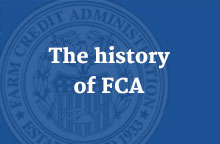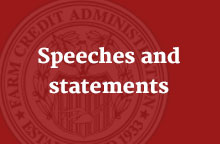Frequently Asked Questions
Click on a category below for FAQs on the respective topic. For frequently asked questions about YBS reporting, go to Frequently Asked Questions and Step-by-Step Instructions for Preparing the Young, Beginning, and Small Farmers and Ranchers Report (PDF).
General questions about FCA Risk identification Similar entity reporting Operating and strategic business planning for diversity and inclusion Flood insurance Borrower rights Collateral evaluations Disclosure and reporting rule Governance changes in 2006 Risk-weighting HVCRE exposuresDisclosure and reporting rule
1. What is the compliance date for the final rule on disclosure and reporting?
The final rule on disclosure and reporting was effective on February 16, 2007, and full compliance with the rule must be achieved beginning the first day of the 2008 fiscal year. If an institution’s fiscal year begins January 1, all reports issued after January 1, 2008, such as the 2007 annual report, must meet the new rule requirements. In addition, full compliance with the new provision requiring an assessment of internal control over financial reporting means the assessment is conducted during the 2008 fiscal year, with the management report of the assessment included in the 2008 annual report to shareholders. (See FCA Disclosure Regulation Summary of the Compliance Dates (PDF, 1 page, 30.61 KB).)
2. May institutions begin complying with some or all of the new provisions right now?
Yes. As discussed in our Informational Memorandum dated April 4, 2007, System institutions may voluntarily adopt rule changes before the compliance date. Once a specific rule change is adopted, however, the institution must continue to comply with the adopted provision. For example, if an institution chooses to use the revised signature and certification provisions under § 620.3 for the 2007 first-quarter report, it must follow the revised provisions for all other part 620 reports.
3. May institutions file their annual reports with FCA electronically rather than on paper?
Yes. In fact, a recent amendment to § 620.4(a) provides that each System institution must prepare and send to FCA an electronic copy of its annual report within 75 calendar days of the end of its fiscal year. This amendment to part 620 became effective on February 6, 2008, and applies to all System bank and association annual reports to shareholders beginning with the 2007 annual report.
4. How do institutions electronically submit their part 620 reports to FCA?
For electronic filing, each institution submits part 620 reports the same way they submit Call Report data:
- Log in through the CRS data submission portal link, which is located on the FCS Information page of the FCA Web site.
- Select Submit Data and choose the applicable report type from the pull-down menu under Type of Submission.
- For further instructions, go to appendix C, “Instructions for Preparing the Call Report Excel Data File and Electronic Submission of the Data,” of the Uniform Call Report instructions, which are located on the Submit CRS Data page under the FCS Information page on the FCA Web site.
5. Where do institutions send required reports (if they are not filed electronically)?
Recent changes to § 620.4(a) require annual reports to be filed electronically with FCA. System institutions will not be allowed to file annual reports in paper form. Other reports required under part 620, including the quarterly report to shareholders, notices, and annual meeting information statements, may be filed by mailing one copy to
Office of Regulatory Policy
Attention: Operations, Management, and Accounting Team — 620 Reports
Farm Credit Administration
1501 Farm Credit Drive
McLean, VA 22102-5090
6. May institutions make part 620 reports available to shareholders electronically rather than on paper?
Yes, provided the shareholder specifically agrees to receive only an electronic copy. (See § 620.2(c).) The agreement to accept electronic rather than paper reports is made between each individual shareholder and the institution; a majority of the shareholders cannot make the decision for everyone. Furthermore, informing shareholders through paper or other types of communication that part 620 reports may be obtained on the institution’s Web site or by calling the institution does not satisfy the requirement for a shareholder to agree to receive only electronic copies. Institutions that wish to communicate or transact business electronically with their shareholders should refer to our electronic commerce (e-commerce) rules at part 609. Our Web site also contains some useful information on e-commerce. Additionally, recent changes to § 620.4(a) require annual reports to be posted on a System institution’s Web site and require the institution to give shareholders prior written notice of the posting. Hard copies of the annual report still must be sent to shareholders who have not agreed to accept electronic versions.
7. Are institutions required to ensure that shareholders receive reports by the regulatory deadlines?
No, institutions only need to send the reports to shareholders by the regulatory deadline. This applies as well to reports sent in electronic form to shareholders agreeing to electronic communications under our e-commerce rules. However, our rule at § 620.2(a) requires the reports to be received by FCA by the regulatory deadline.
8A. Do all board members of an institution have to sign the reports required by part 620?
No. Our rule at § 620.3(b)(3) states that only one board member, who is formally designated to act for the entire board, needs to sign and certify part 620 reports. If the named board member is unwilling or unable to sign the report, then his or her name and the reason for not signing must be disclosed in the report. Our rule also requires the chief executive officer and the chief financial officer (or person responsible for preparing financial reports) to sign and certify part 620 reports. It is important to note that all part 620 reports, whether in paper or electronic form, must satisfy the signature and certification requirements of § 620.3(b) and (c).
8B. Must the annual meeting information statement be certified as financially accurate by the signatories to the report?
In accordance with § 620.21(a)(3), the annual meeting information statement must reference the most recently issued annual report and provide any material or necessary financial updates to the annual report. If the financial information in the information statement correlates with the financial information presented in the annual report and the appropriate certifications as to financial accuracy are included in the annual report, then the annual report certification may be treated as “incorporated by reference” into the information statement in satisfaction of the rule. However, if financial information is presented in the information statement that does not correlate with the financial information presented in the annual report, then the signatories to the report must separately certify the financial accuracy of the annual meeting information statement.
8C. Is there any statement that accompanies the signatures to the annual meeting information statement?
Each annual meeting information statement must be signed, and each signatory has the fiduciary responsibility to review the information statement and determine that it is accurate and not misleading before signing. If a separate financial certification is not part of the information statement, institutions are expected to include a statement above the signatures that the signatories have reviewed the annual meeting information statement, determined that it is accurate and not misleading, and that it has been prepared in accordance with all applicable statutory and regulatory requirements.
9. Which institutions have to conduct an assessment of internal control over financial reporting and include a report of the assessment in its annual report?
Under our rule at § 620.3(d), the deciding factor for determining whether an institution is required to conduct an assessment of internal control over financial reporting is whether its total assets are more than $1 billion on the last day of the prior fiscal year. All institutions meeting this requirement must conduct the assessment and then include management’s report on the assessment in their annual reports for the reporting period. Fluctuations in assets during a fiscal year do not affect an institution’s compliance with the requirement; it is an institution’s total assets status on the last day of the prior fiscal year that determines applicability of the requirement.
10. Does the new five-year auditor rotation requirement include the years of service accumulated before the compliance date of the rule?
No, all external auditors are given a “clean slate” for purposes of the rotation requirement in § 621.32. An institution may not retain the services of lead and reviewing audit partners for more than five consecutive years, with the five-year clock starting on the first day of the 2008 fiscal year. The actual number of audits conducted or audit reports signed does not factor into the rotation calculation.
11. Must System institutions disclose in their annual reports the fees paid to the external auditor for both audit and nonaudit services?
Yes. Beginning with the 2007 annual report, each FCS bank and association must disclose these fees. A new requirement at § 620.5(l)(2) requires each institution to disclose in its annual report the total fees paid to the qualified public accountant, breaking the fees into three categories: audit services, nonaudit services, and tax services. The types of nonaudit services must be identified and each institution must indicate that the nonaudit services were approved by its audit committee. The fees reported are for the 12-month period covered by the annual report. This new requirement applies only to fees paid to the qualified public accountant engaged to conduct the reporting Farm Credit institution’s financial statement audit. The requirement is intended to help shareholders assess the independence of the institution’s external auditor. This requirement does not apply to fees paid to other qualified public accountants not engaged to conduct the institution’s audit.
12. Are there any limits on the types of nonaudit services an external auditor may provide?
Yes. Beginning with fiscal year 2008, under FCA regulation § 621.31(a) external auditors engaged to conduct a Farm Credit institution’s audit can no longer provide services related to bookkeeping, financial information systems design, appraisal and valuation, or internal audit outsourcing. External auditors also cannot perform management or human resources functions, provide legal and expert services unrelated to an audit, or advocate an institution’s interest in litigation, regulatory, or administrative proceedings unrelated to the external audit. All other nonaudit services performed by the external auditor require the prior approval of the institution’s audit committee.
13. Must a System institution’s audit committee pre-approve all nonaudit services or just those performed by the external auditor engaged to conduct the financial statement audit?
An institution’s audit committee only needs to pre-approve nonaudit services when those services are performed by an external auditor engaged to conduct an institution’s audit. Please keep in mind, however, that § 621.31(a) prohibits external auditors engaged to conduct an institution’s audit from performing certain nonaudit services. FCA’s regulations do not limit the types of nonaudit services or require audit committee approval of nonaudit services that may be performed by consultants or qualified public accountants not engaged to conduct the institution’s financial statement audit. We encourage System banks and associations to develop policies and procedures governing the pre-approval of the external auditor to perform both audit and permissible nonaudit services.



